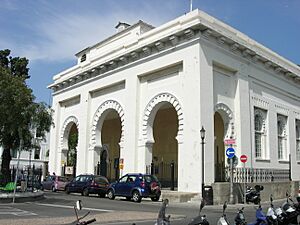Cathedral of the Holy Trinity, Gibraltar facts for kids
Quick facts for kids Cathedral of the Holy Trinity |
|
|---|---|
| Gibraltar Cathedral | |

Main entry of the Cathedral of the Holy Trinity in Gibraltar viewed from Cathedral Square, depicting its Moorish-style horseshoe arches.
|
|
| 36°08′18″N 5°21′15″W / 36.138235°N 5.35406°W | |
| Location | Cathedral Square |
| Country | Gibraltar |
| Denomination | Church of England |
| History | |
| Status |
|
| Founded | 1838 |
| Founder(s) | John Pitt, 2nd Earl of Chatham |
| Dedication | Holy Trinity |
| Dedicated | 1838 |
| Events | Explosion of the RFA Bedenham (1951) |
| Architecture | |
| Functional status | Active |
| Architect(s) | Peter Harrison |
| Style | Moorish Revival |
| Years built | 1825–1832 |
| Administration | |
| Archdeaconry | Gibraltar |
| Diocese | Diocese in Europe |
The Cathedral of the Holy Trinity is a special church for the Church of England in Europe. It is located in Cathedral Square in Gibraltar. People sometimes call it Gibraltar Cathedral.
It is important not to confuse it with the Cathedral of St. Mary the Crowned. That is Gibraltar's Roman Catholic cathedral. The Cathedral of the Holy Trinity is famous for its unique Moorish-style architecture. This means it has designs inspired by old Moorish architecture. You can see this in its cool horseshoe arches. This style fits well with Gibraltar's history, as Moors once controlled the area.
Contents
History of the Cathedral
Building the Church in the 1800s
The church was first built for Anglican people living in Gibraltar. The older King's Chapel was mostly for military use. In 1820, John Pitt, who was the Governor of Gibraltar, convinced the British Government to help. They sold an old building and used the money to build a new church.
Building started in 1825 and finished in 1832. The first design was by Peter Harrison around 1740. It did not have the Moorish arches we see today. Later, Colonel Pilkington of the Royal Engineers took charge. He changed the design to include the Moorish style. While it was being built, the church was used as a hospital for a short time. This happened during an outbreak of yellow fever.
The church was officially opened in 1838 by Archdeacon Edward Burrow. Queen Adelaide, the wife of King William IV, was there. In 1842, the church became a cathedral. This happened when the Diocese of Gibraltar was created. George Tomlinson became the first Bishop of Gibraltar at that time.
The Cathedral in the 1900s
The cathedral was not badly damaged during the Second World War. After the war, Bishop Harold Buxton asked for donations. He wanted to "Say Thank You to Malta and Gibraltar." The money collected helped improve St Paul's Pro-Cathedral in Malta and the cathedral in Gibraltar.
In Gibraltar, the money was used to build new rooms for the clergy. It also helped create a second chapel inside the cathedral. This chapel is in the south aisle and is dedicated to Saint George. It remembers everyone who died in the Mediterranean Sea during the war. A small stone from Coventry Cathedral is in the wall near the baptismal font. Coventry Cathedral was destroyed in a bombing during the war.
On April 27, 1951, there was an explosion of the RFA Bedenham. This caused a lot of damage to the cathedral. The roof was lifted, and the stained glass windows broke. The side windows were replaced with plain glass. The broken pieces of colored glass were used to make a new stained glass window. This window is still in the east wall, above the main altar. The cathedral needed many repairs and reopened for Christmas that year.
Who Leads the Cathedral?
Like most Church of England cathedrals, the main priest in charge is called the Dean. The current Dean is Ian Tarrant. The Bishop in Europe is based in Brussels. There is another important church there called a pro-cathedral.
Gallery
-
Cathedral's nave.
-
Cathedral's lectern and pipe organ.
See also
 In Spanish: Catedral de la Santísima Trinidad (Gibraltar) para niños
In Spanish: Catedral de la Santísima Trinidad (Gibraltar) para niños
- Anglicanism in Spain
- List of cathedrals in the United Kingdom
- Holy Trinity Pro-Cathedral, Brussels
- St Paul's Pro-Cathedral, Valletta







